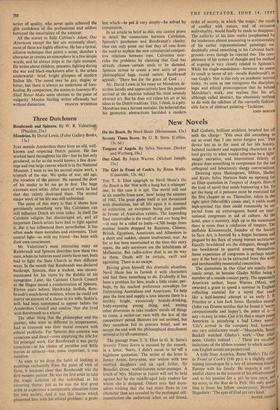New Novels
On the Beach. By Nevil Shute. (Heinemann, 15s.) Tongues of Angels. By Sylva Norman. (Seeker and Warburg, I 8s.) ' The Girl in Front of Cook's. By Reese Wolfe. (Constable, 12s. 6d)
THE T. S. Eliot epigraph to Nevil Shute's On the Beach is the 'Not with a bang but a whimper' one. In this case it is apt. The world will end in six months from now, 'now' being the summer of 1962. The great globe itself is not threatened with dissolution, but all life upon it is doomed to extinction, an exception being just possible in favour of Australian rabbits. The impending final catastrophe is the result of not one bang but —it may be a relief to learn-4,700 bangs from nuclear bombs dropped by Russians, Chinese, British, Egyptians, Americans and Albanians in a short and sudden, almost inadvertent, war. As far as has been ascertained at the time this story opens, the only survivors are the inhabitants of Melbourne. But radio-active dust is on its way to them. Death will be certain, swift and agonising. There is no escape.
Having given himself this dramatic situation, Nevil Shute has to furnish it with characters and find them something to do. Evidently it has been a problem for him, made a little easier, per- haps, by his marked preference nowadays for fraternising Australians and Americans. To help pass the time and supply a love interest there is a terribly bright, excessively brandy-drinking, body-exposing young thing, and, among other diversions to take readers' minds off things to come, a motor-car race with the last of the competitors' petrol. Horrors are not omitted, but they somehow fail to procure belief, and we accept the end with the philosophical detachment arrived at by all concerned.
The passage from T. S. Eliot in G. B. Stern's Seventy Times Seven is excused by the remark, in a letter, 'Sorry, I didn't mean to let off a highbrow quotation.' The writer of the letter is Janice Arnot, forty-nine, war widow with two married daughters and an aged father, Sir Benedict Orme, world-famous actor-manager. A touch of Mrs. Miniver in Janice will not be held against her by the middle-aged lady readers for whom she is designed. Others may find them- selves wishing that she had more flaws in her character than are revealed by the prolonged self- examination she undertook when an old friend, Raff Godwin, brilliant architect, brushed her off with the charge : 'You once did something to me so cruel that I can never forgive you.' This device lets us in for most of her life history. Isolated incidents and supporting characters in it lend gravity to what would otherwise be a light- weight narrative, and intermittent felicity of phrase does something to compensate for the too colloquial and laboriously slangy conversations.
Drawing upon Shakespeare, Milton, Shelley and Keats, Sylva Norman finds no opening for an Eliot quotation in Tongues of Angels. Hers is the kind of novel that needs humouring a bit. To get the hang of it patience must be exercised for the first chapter or so. Thereafter, taken in the right spirit (Meredith's comic one), it yields more high-spirited fun than could reasonably be eX- pected from an extravaganza based on inter' national congresses in aid of culture. At the hotel, once a nunnery, high up in the mountains there is more than a confusion of tongues. The ineffable Kiissenmacht, founder of the SocietY to Save Art, is harried by a bogus baroness and plagued by his flock of young women secretaries. Equally bewildered are the delegates, though not too bewildered to quarrel among themselves. Some experience of congresses is perhaps neces- sary if the best is to be extracted from this wittY and inexhaustibly resourceful concoction.
The quotations in Our Glad are mostly fronl comic songs, its heroine Gladys Miller being a member of a seaside concert party. The apparentlY American author, Joyce Warren (Miss), wait awarded a grant to spend a summer in England collecting material for a novel ,that reads like a half-hearted attempt at an early J. 0. Priestley or a late Jack Jones. Harmless enough (John van Druten testifies that he found it 'warn); companionable and happy'), the point of it-1 any—is easy to miss. Can it be that a smart young American is parodying a bad Limey novel? 'Lily's arrival in the company had, however, one very satisfactory result'—`Meanwhile, BennY Buckell watched Gladys's work'—'One after' noon, Gladys noticed . . These are excellent imitations of the lifeless manner in which second' rate English novels are perpetrated. A trifle from America, Reese Wolfe's The Girl in Front of Cook's (146 pp.), is a slightly enter' taming monologue by a boy of seventeen touring, Europe with his family. He imparts a sort 01 wistful charm to the account of his misadventures, and to his passion for a girl he saw once, no° no more, in the Rue de In Paix. His only quota' tion is from his fellow countryman, Hermarni Hagedorn : The eyes of God are very kind.' d
DANIEL GEORCIP


































 Previous page
Previous page